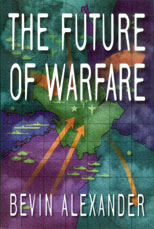The Future of Warfare
 Click here to purchase from Barnes & Noble.
Click here to purchase from Amazon.com.
Click here to purchase from Barnes & Noble.
Click here to purchase from Amazon.com.
Introduction
When I commenced writing this book, I was well aware of the famous line from the English economist, Lord Keynes: "The inevitable never happens. It is the unexpected always." No one, of course, can predict the future of warfare with certainty. Yet great events in the late twentieth century have given our generation more reason than most to believe that we can prophesy with some accuracy what sorts of conflicts are likely to occur, how wars are likely to be fought, and which ones will involve the United States---at least for a generation ahead.
This book examines the degree to which changes in war brought on worldwide by theory and practice during this century will affect war in the next century. It also studies the influence technology has had and may have on military strategy, battle tactics, and unit structure. But, since the greatest challenges will be borne by the United States, the last superpower, this book focuses primarily on what it will encounter and the sorts of wars it will have to fight in the decades ahead.
With the disintegration of the Soviet Union in the early 1990s, the discipline that had held the world firmly in two antagonistic ideological camps abruptly snapped. For a euphoric moment much of the world believed that the principal divisions on the planet had been healed and that we could look forward to a peaceful, cooperative future.
We quickly learned how wrong we were. Ethnic, religious, and nationalistic conflicts that had been suppressed for generations by East-West bipolarity suddenly reemerged throughout the world, especially in the former Soviet Union and among its erstwhile satellites. Witches' caldrons that had been stewing disagreements, rivalries, and hates, sometimes for centuries, abruptly boiled over. The list of social upheavals seems endless. Among others are clan, tribal, and ethnic battles in Africa; religious disputes in Africa, Asia and Europe; racial collisions in South Africa; deep divisions between rich and poor in Latin America, and ethnic conflict in the former Yugoslavia, Turkey, Iraq, Azerbaidzhan, Georgia, Spain, and elsewhere.
The United States will avoid most of these largely internecine conflicts. It also will avoid wars over political ideology. The repudiation of Communism by nearly all peoples, including its tacit rejection by the Chinese, has left no ideology strong enough to challenge capitalism and market economies.
Russia constitutes no greater danger than any other great power. The emergence of jingoistic elements there have aroused fears of aggression. Russia may project itself more strongly onto the world stage, but few Russians have ambitions to expand out of northern Eurasia.
It is inconceivable that any nation controlled by sensible rulers will resort to nuclear warfare. Use of a nuclear device would likely bring instant retaliation which could accelerate beyond human capacity to control, making much of the earth uninhabitable.
An irrational dictator might use the bomb, and there's the chance that a terrorist organization might secure a device and plant it somewhere, perhaps in a large city. This would bring on a catastrophe, but rational rulers would not automatically resort to nuclear holocaust. Instead, likely using precision strikes, nuclear or otherwise, they would attempt to destroy the dictator, his weapons and his scientists, or they could try to destroy the places in other countries where the guilty terrorists find refuge. Retribution is so certain that only a completely unstable, nihilistic ruler would risk his own and his country's destruction. As a consequence, nations are likely to face only conventional, nonnuclear wars.
Nevertheless, the United States will face the continued threat of war. The principal cause will be the revival of aspirations for power by avaricious nations or ambitious leaders. Lust for power has been the bane of mankind at least from Neolithic times. Desire for power is closely tied to economic issues. Disputes over possession of the earth's riches and resources have always been the primary reasons for wars. For nearly fifty years the East and West held economic conflicts in check by dividing the world's resources between them. With the end of the Cold War this expedient lost its validity.
Bevin Alexander<< More on 'The Future of Warfare' << Back to top